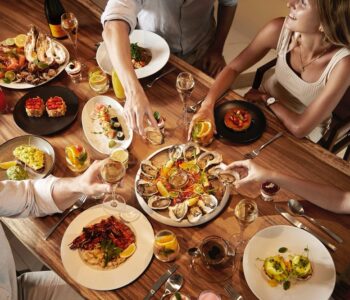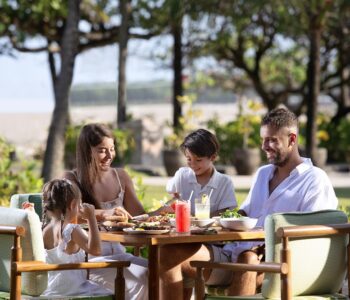Note: This is a community submitted Op-ed. An independent article written by Carole Favre and submitted to NOW! Bali for publishing upon review and approval.
I’m reading, feet up, my Kindle in one hand. I hear clapping. I look up and see a child being lifted by two adults, his arms shooting up in the sky. His smile is that of a hero who has just conquered the ocean. This young boy has just won today’s surfing competition.
A wave of digital nomads, bar staff, surfers, local and foreign tourists join in and the clapping gets louder. My smile gets wider. I add a few whistles to his victory. I am reminded of why I live in Bali.
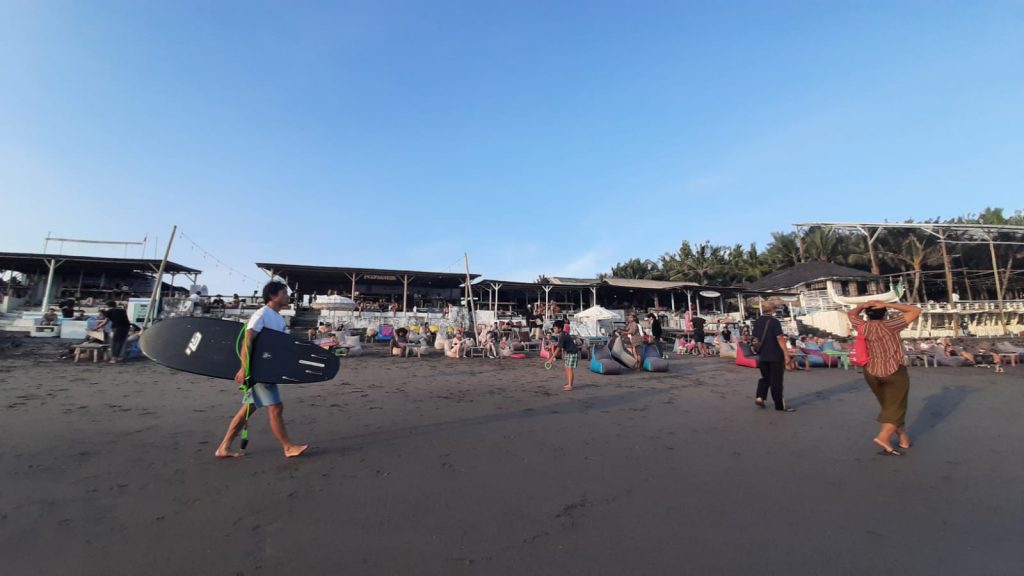
Today, on Echo Beach, I am witnessing the making of a very young man who will remember this moment for the rest of his life… a moment where a community of locals and ‘bulés’ (foreigners), stopped all they were doing to celebrate his achievement.
But my smile soon disappears. In one month, all the beach bars that so many of us love and have supported before and throughout the pandemic, will be destroyed. This cosy stretch of humble paradise is being ‘cleaned up’.
Our bamboo roofs, our sticky chairs, our wonky tables will all be burned to the ground, and for what? A brand-new, modern and more lucrative ‘brick and concrete’ development with double the number of rentable units — just as they have recently done on Berawa Beach as well. A great thing for the local economy? Not really…
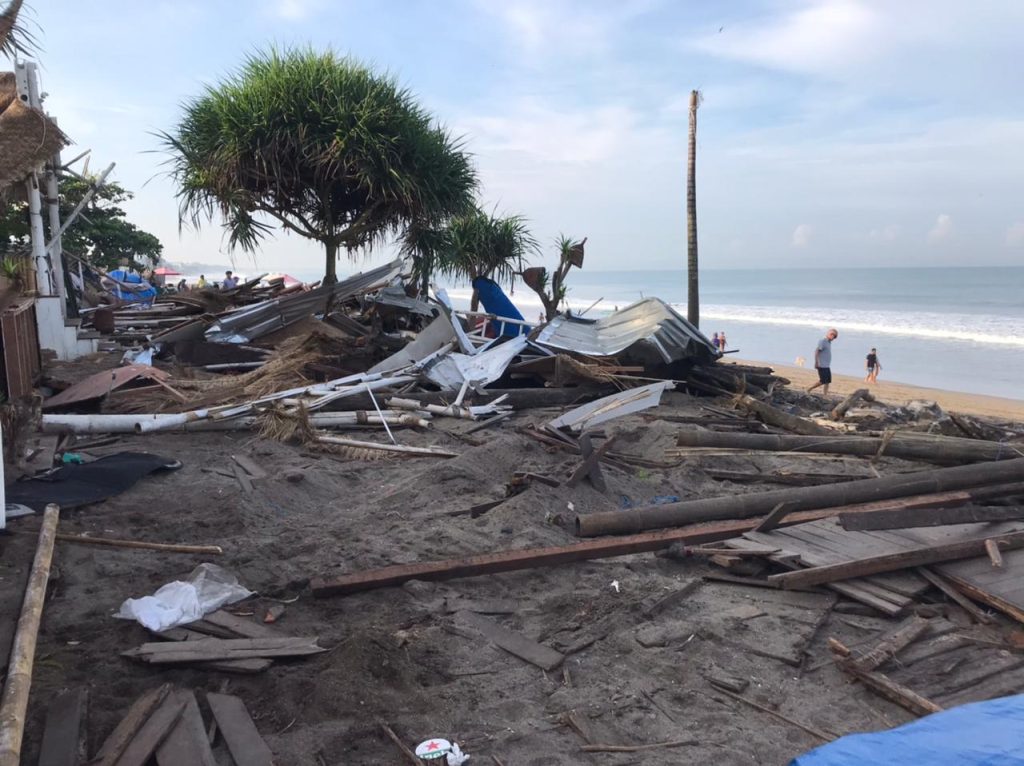
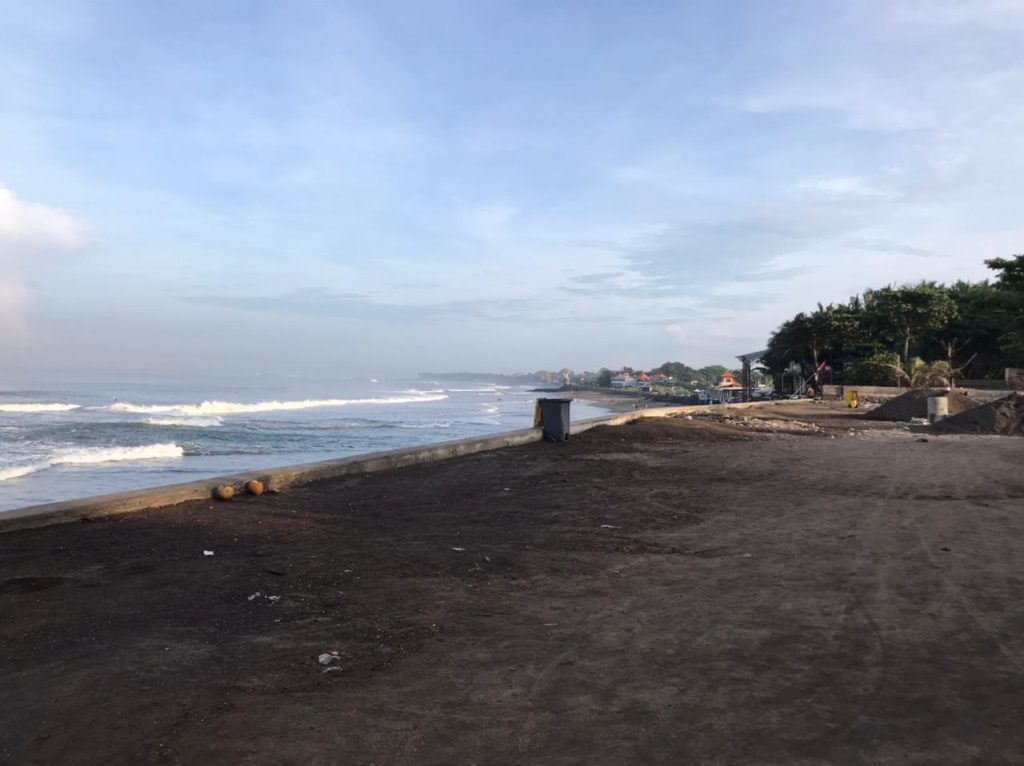
I am a Lecturer and International Expert in Responsible Tourism. I have worked for the United Nations and other similar organisations, as well as several governments on all continents. I have visited over 70 countries and specialise in small island destinations.
Part of my job is to study tourism trends. I keep on top of what tourists look for. Today, more than ever, visitors (domestic and international) seek to experience something that feels special and different: something to remember, that stands out. Asian travellers are particularly attracted by sites that are Instagrammable, which they can share with friends and family.
In tourism, the ‘look’ of a place matters a lot. Tourists love to take pictures of innovative buildings or unique and untouched landscapes. However, they only spend their hard-earned money in the places that radiate a specific type of ambience: one that makes them feel welcomed, safe, relaxed and happy.
So, what tourists connect most with, is not only ‘the look’ but essentially the ‘atmosphere’ of the places they visit. In fact, a tourism destination can only be successful when tourists feel they’re home and belong… when they come back again and again, in and outside of season, even in times of crisis. Their attachment is emotionally-driven. This is what ensures the real long-term financial success of a destination.
One of the reasons that France has remained the number one travel destination in the world for over 50 years, is because you can sense ‘atmosphere’ in every village, market, café and small shop you visit. And that atmosphere is different in every region, which is why tourists keep on revisiting. None of the places you visit are designed for tourists: they are designed by and for the communities that live there, which gives them their unique character.
Communities like those you find on Echo beach, where I am now.
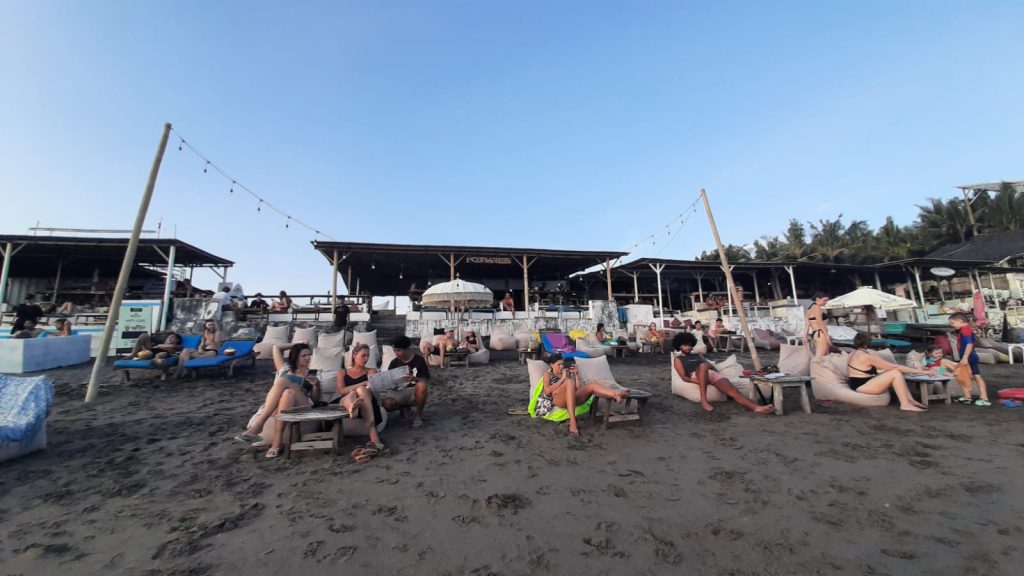
Photo by Carole Favre
Communities of residents, tourists and digital nomads, who seek meaning and beauty in authenticity and simplicity; who love to connect exchanging stories about the seas. People who come to work or surf daily, amongst the barking dogs, on a stretch of Bali where everyone is equal under the sun. This development is robbing all of them of an affordable place to connect… but I’m sure that the big and expensive beach resorts are licking their lips at the prospect of a greater supremacy!
Communities of waiters, of staff who know my name because I’ve become part of the furniture. Staff who are all about to loose their jobs, even though they made this beach a second home to many.
Communities of independent entrepreneurs who worked hard to build and sustain their small businesses, despite many challenges (from volcano eruptions to earth quakes, from fires to pandemics). They are losing everything they created.
With rent set to increase ten-fold (from 7 million to 70 million IDR p.a.), they can’t afford to stay. It would be suicidal to take a loan – even if they could get one – at a time where the future of tourism remains shaky.
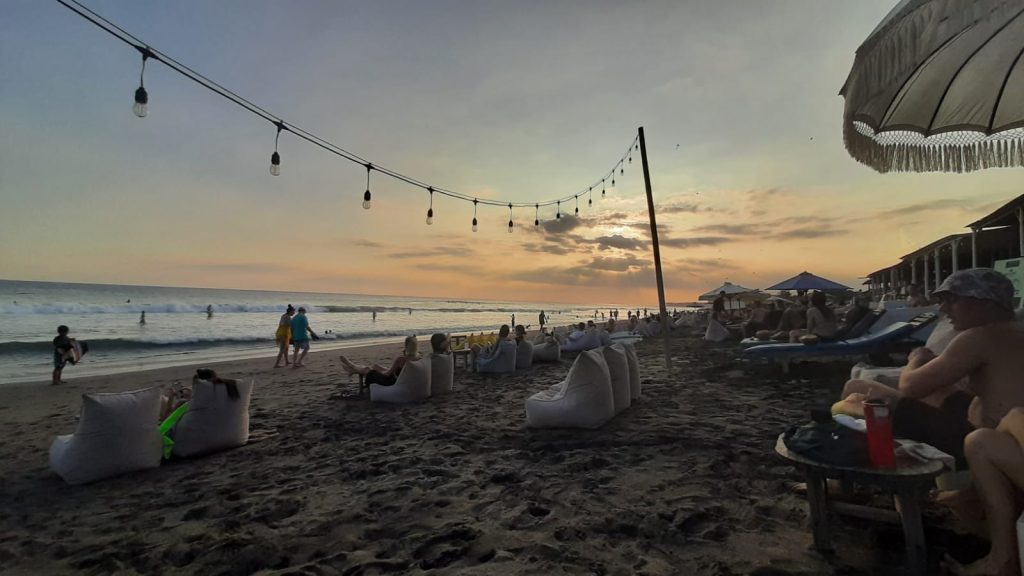
photo by Carole Favre
Adding insult to injury, the destruction will commence on 01 July, at the peak of the tourist season, robbing all local businesses of the only chance they had to recuperate some of the money they lost during Covid.
But it gets worse: the vendors are expected to do all the demolishing work themselves… as if the pill wasn’t already too painful to swallow!
It’s sunset now.
A dad is teaching his son how to surf. Five Javanese tourists are dipping one toe at a time in the ocean, screaming, laughing and slowly making friends with the water. A mum is running after her tiny daughter who like Moana, is not listening and seeks adventures. An old Balinese couple is rubbing sand on their bodies and on that of their grandchildren.
I see Kira, my favourite waitress, whose arms make me feel home, and whom I won’t be able to kiss and hug, when she feels sad and lonely. I see Nyoman, my favourite waiter, who is slowly saving money to open his own bar. I see the dreams that will be crushed and the jobs that will be lost. As if Covid had not done enough damage already!
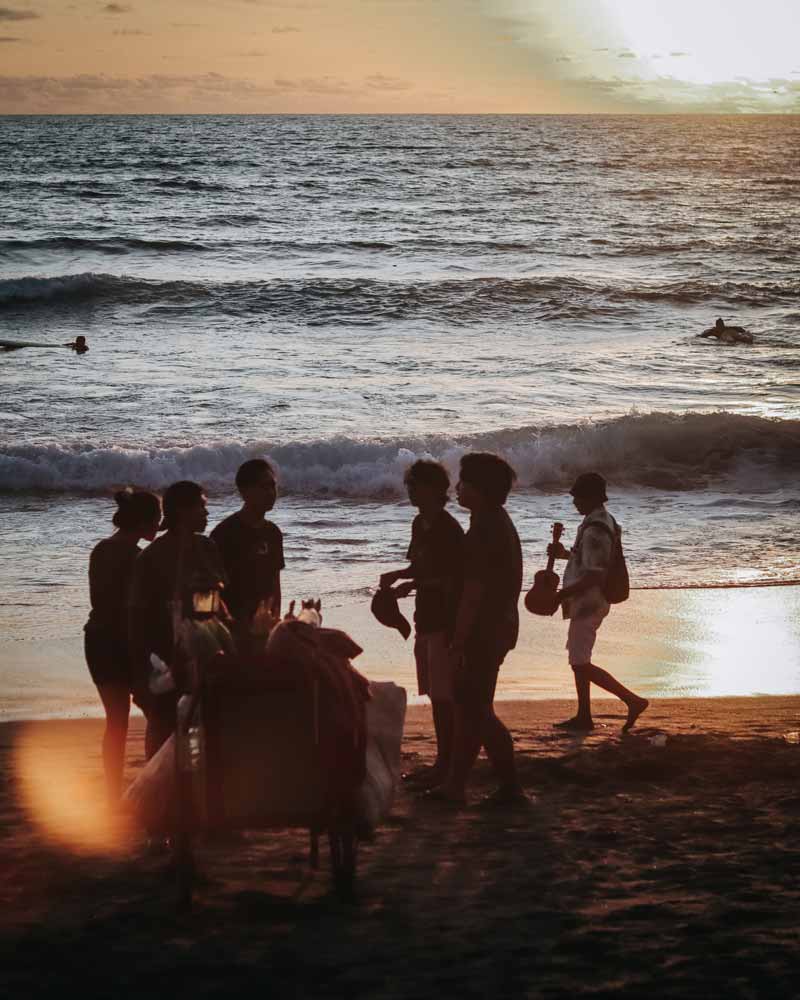
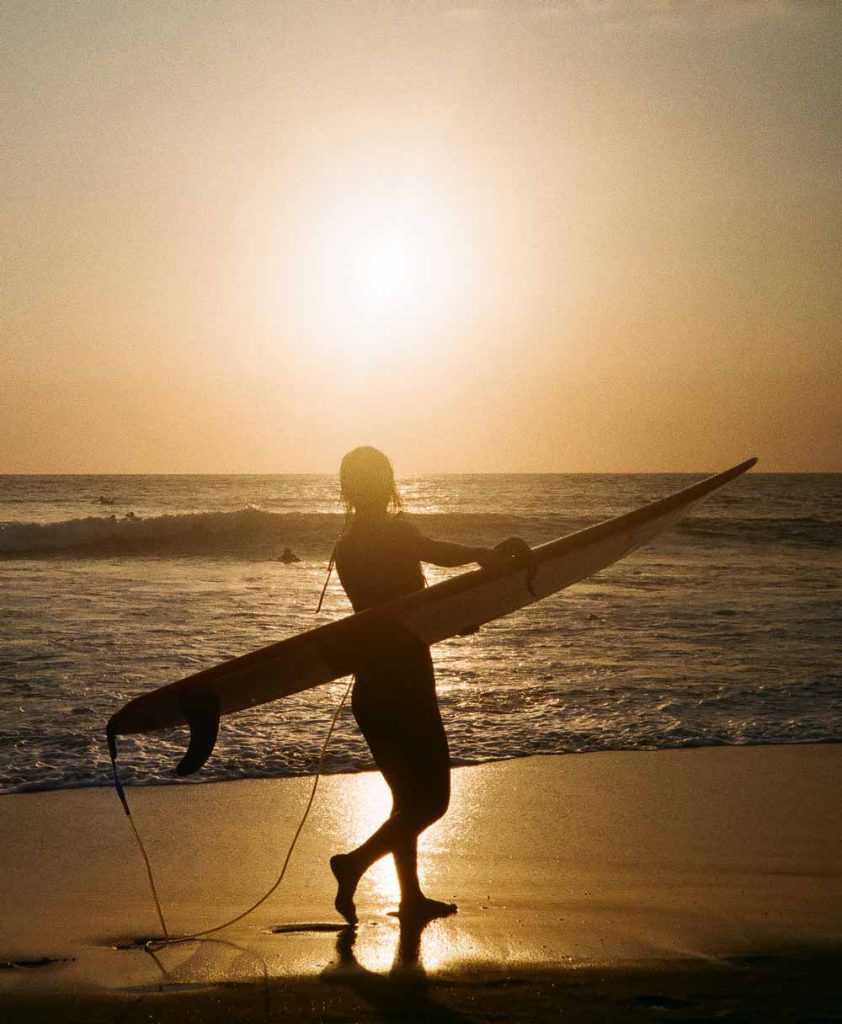
Made is roasting corn, Bagus is walking towards me with delicious homemade cookies I can’t resist. Mo is selling bracelets and necklaces. Wayan is taking pictures of novice surfers. Nyoman is giving foot massages. Ketut is playing music on his deck for his clients.
Some people are aware, some not, that the magic they feel and witness tonight, will soon vanish… but not one person on this beach wants all that we have to disappear. Not one. We love it because it’s real. There is no pretence. There is no make-up. That’s why we show up, day after day.
When people with power and money choose to destroy places that make people happy, they don’t only destroy buildings, they kill the home, the heart and soul of thriving communities.
You see, the more you replace the old by the new, to make it look ‘prettier’ – as a way to justify unwanted investments – the more you erase the charm, uniqueness and authenticity that attract tourists and residents alike. Beauty can never be found in the sanitisation of people and places.
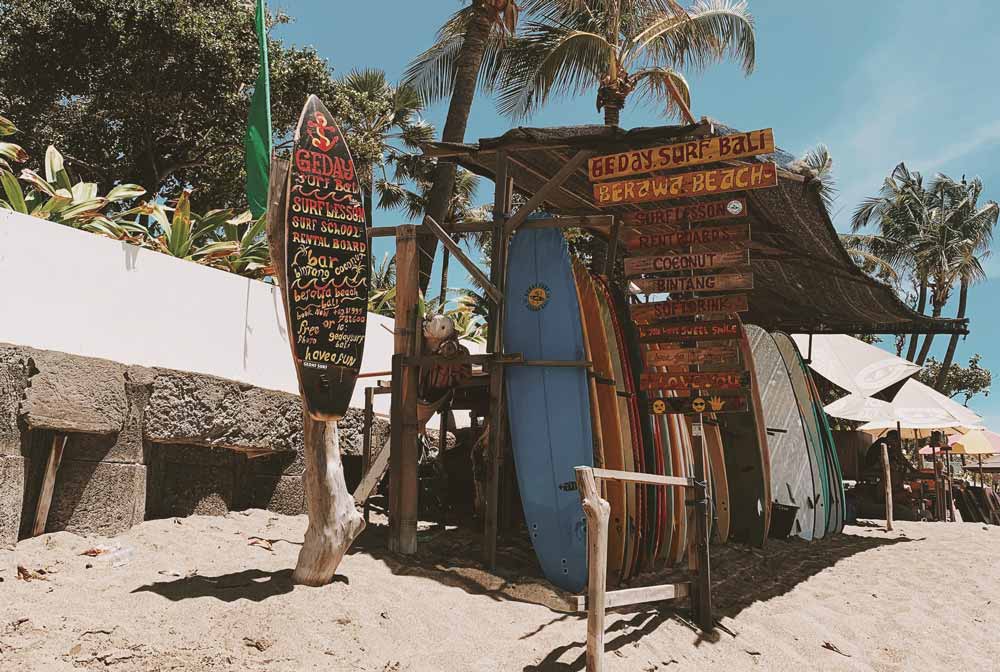
As humans, our beauty exists in the unique traits we hold inside of us: it can never be replaced by plastic surgery. We marry the men or women who make us laugh, who have a personality that make us vibrate. When we go for ‘look’ only, the relationship doesn’t last. You leave unfulfilled and disappointed.
Throughout the pandemic, I read plenty of articles claiming that many countries were eager to learn from past mistakes to develop tourism more sustainably. I didn’t believe a word of it, especially in the context of smaller destinations like Bali. In fact, I predicted the opposite – that there would be a mad gold rush to make up for lost time and money. What investor would be mad enough to reject the opportunity to buy land and tourism businesses at massively discounted prices?
There are so many alternative investment initiatives, which would elevate Bali and make it shine globally!
Imagine investing in rubbish collection to clean the ocean and the beaches littered with plastic. Imagine using waste as raw material to manufacture innovative products. Imagine Bali becoming a beacon of technological sustainability…
Imagine investing in teaching local souvenir vendors how to source and sell beautiful products made in Bali (not China); products, which reflect the culture and skilled expertise passed through generations. Imagine a people preserving their unique heritage proudly, in a way that brings them high income streams…
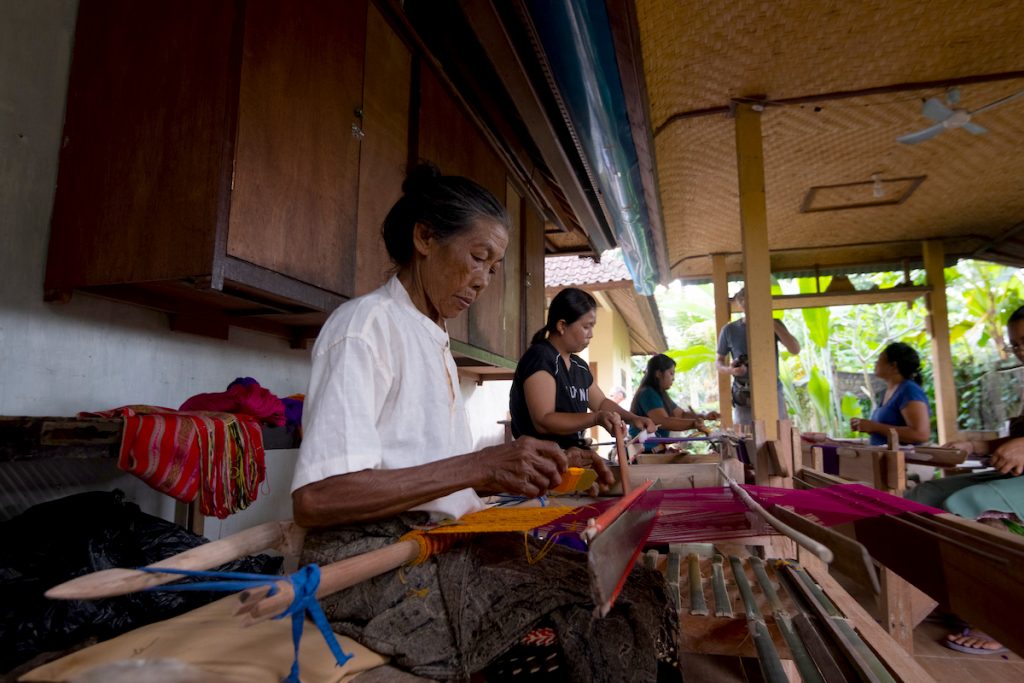
Full story here, photo by David Metcalf
Imagine investing in land ownership for the purpose of creating a network of trails that would open urban visitors to rural tourism. Imagine contributing to increasing the health of a nation. Imagine reducing cardiovascular diseases and respiratory infections – the biggest killers in this country – by offering domestic tourists a chance to do more exercise and improve their diet…
Why is it that we always fail to imagine what could be best and opt to implement what is worst?
Because it is all too creative, too innovative, too complicated, too much hard work – no immediate return on investment! Who wants to build a meaningful legacy for the good of present and future generations when you can make easy and quick money?
In Asia, there is a history of natural disasters being used to appropriate land of high value at the cheapest possible price. It’s happening again… right under our noses and it smells bad: sadly, it looks like greed wins all the time, even on an island where it is the Gods that should decide.
Tourists come to Bali to connect with its unique blend of spiritual harmony and authentic beauty… something that is heartfelt, not made by money (we are not in Dubai or Miami).
I hope that one day – very soon – the Gods make their voices heard to stop another kind of pandemic: that of the slow and persistent eradication of what makes this island truly special: the unseen sacred thread of openness that links all its communities.
I hope they wake up to stop this erosion of Bali.
Note: This is a community submitted Op-ed. An independent article written by Carole Favre and submitted to NOW! Bali for publishing upon review and approval.


